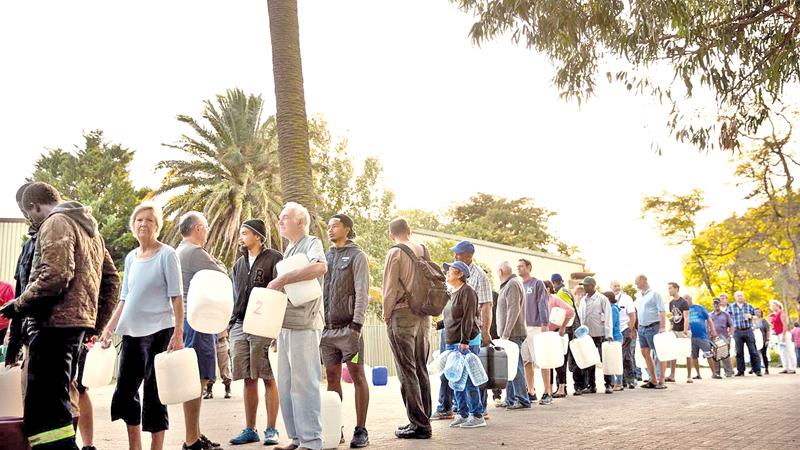
South Africa’s capital is the first modern city to face a critical drinking water shortage – thanks to climate change, it won’t be the last
How quickly can a big, modern, technologically-advanced city be transformed into something like a giant refugee camp? We may soon find out. Cape Town, South Africa – a city with a population of more than four million people – is about to run out of fresh drinking water. Unless the region is hit with a few big storms in the coming months, on July 9th – a day that has become known in Cape Town as “Day Zero” – the municipal water system will be shut off and man, woman and child in the city will have to wait in line at water distribution points for their daily ration of 6.6 gallons of water. This is the first time a modern city has had to resort to such dramatic measures to deal with drinking water shortages. But thanks to climate change, it surely wont be the last.
Uncertainty looms high
No one knows for sure what’s coming, or how bad it will get. If you drew up a list of cities in the world where officials have thought hard about the implications of climate change, Cape Town would certainly be on it. The city has won awards for its climate preparations, and is a member of the Rockefeller Foundation’s 100 Resilient Cities program. As Adam Welz notes in an excellent piece for Yale E360: “South Africa has some of the world’s most detailed, progressive water laws and deep expertise in water science and management, climate science, and meteorology. [Cape Town] has mapped projected sea level rise and convened countless climate change adaptation planning sessions. Last year, Cape Town’s mayor said, ‘We cannot plan anything without factoring in the impact of climate change.’”
The question is, what kind of impacts are they planning for? Climate models show that rainfall in South Africa is likely to decline over the coming decades, but in the near term, the models are still maddeningly imprecise. That leaves city officials in a tough spot: Do they plan for a 20 percent decline in rainfall over the next ten years – or a 50 percent decline? It’s a similar issue with sea level rise. There is no question that as the climate heats up, the seas will rise – but exactly how far, and how fast, is difficult to say. It could be two feet by the end of the century. Or it could be eight feet. Or it could be more.
This near-term uncertainty paralyzes politicians who try to plan for climate impacts. How do you find the money and political will to build a new drinking water reservoir if you don’t know a) if you’ll really need it and b) how big you really need to build it? Few scientists predicted that a single storm could drop 27 trillion gallons of rain over Texas and Louisiana. And yet that’s what happened. The past is no longer prologue. Of course, politicians deal with this kind of uncertainty all the time with threats like, say, terrorism, but with climate change, it often becomes an excuse for inaction.
Climate change widens the gap – and tensions – between the Saved and the Screwed. The looming water shortage in Cape Town is a parable of the corrosive effects of social inequity. A city of very rich (mostly white) and desperately poor (mostly black). If the municipal drinking water supplies are shut off on Day Zero, the rich can afford to spend $6,000 to drill a private well and fill their swimming pool with fresh water. The poor, meanwhile, will have to wait in line at water distribution centers. If the line is too long, they will have to buy water on the black market and hope it is clean. If it is not, they will get sick, and some of them, inevitably, will die. “Inequity plays out in water very obviously, and what we’re seeing in Cape Town risks becoming an example of that,” Giulio Boccaletti, the global managing director for water with the Nature Conservancy, told the Washington Post. “The social contract breaks down, if the rich find their own solution and leave the rest to fend for themselves.”
Government isn’t going to be much help. One of the great accomplishments of the 20th century was the acceptance of the idea that clean air and clean drinking water are public goods and providing them to all citizens is one of the most basic responsibilities of a functioning government. This idea is universally accepted in the U.S. and Europe and most of the rest of the civilized world. But this basic pact is breaking down in Cape Town as residents scramble to secure their own drinking water supplies. “The lesson here is that you can’t trust the government to provide water for you,” said Gabby De Wet, whose family owns De Wet’s Wellpoints and Boreholes. “People are taking things into their own hands.”
In the coming years, the failure of government to deal with the impact of climate change is likely to become more and more apparent. At some point, residents of coastal cities will realize that the feds are not going to bail them out when their homes are inundated. When crops fail, there will be no paycheck. And when the tap goes dry, you have to find water. –Rolling Stone
